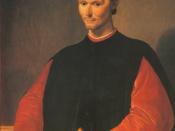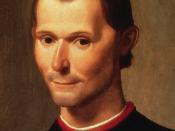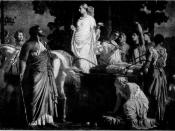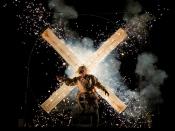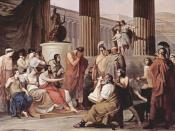After much thinking about the questions that you handed out, I decided to come up with my own analyses of the Renaissance compared to not only the middle-ages, but also the ancient text. The majority of the questions that you handed out dealt with how the Renaissance was a rebirth of the classical views of life. Also on how the Renaissance felt as if people were in charge of the natural world. Machiavelli is the Renaissance text that I have chosen to compare to Dante from the middle-ages, and the Odyssey from the ancient text. This is an attempt to show how Machiavelli seemed to posses many of the same qualities that Odysseus had, and also I will attempt to show how the bias of the middle- ages help to create the open discovery of the Renaissance.
At first one would think that Machiavelli and Aeneas would be the best to compare.
But after looking at the two a little closer I came to the conclusion that Machiavelli would not have got caught up in the whole Dido courting phase. During this stage of courting Aeneas looses focus of not only his mission, but also begins to neglect his crew. Machiavelli certainly would not have allowed himself to fall into this lost sense of awareness. Also another example of how Aeneas falls quite short of Machiavelian standards is how Aeneas is not bright enough to patch up the loose ends that he has created in Carthage. When Aeneas tells Dido that he must leave her and her people behind to found the great city of Rome he did not think about the backlash that could come from this neighboring nation, that is also trying to establish a power base. Machiavelli would have made sure that Carthage was either a friend of Rome, or that Carthage would never become a strong military force, capable of attacking Rome. The only example of a comparison between Aeneas and Machiavelli was after Mercury re-focused Aeneas on what his true mission is. Only then does Aeneas act like Machiavelli saying he will leave and tell Dido nothing, and then only telling her when she asks. He even goes as far as pulling her emotional strings when he says he must do it for his own grandchildren's betterment. Now this would make Machiavelli smile, although needing Mercury as a messenger of the gods would be scoffed at by Machiavelli because he felt as if religion was useless anyway. On the other hand, A stronger case can be made that Machiavelli borrowed more of Odysseus's personality traits.
Machiavelli seemed to believe that it is better to do what is best for the whole by doing what ever is necessary to achieve that goal. This reasoning can be seen throughout the Odyssey. In many instances Odysseus lies, deceives people, and pays extra special attention to the motives behind peoples actions in-order to accomplish his goal. One example of Odysseus deceiving is when he creates the Trojan Horse. It is this trickery that causes the fall of Troy. Another example of Odysseus acting like Machiavelli is after he has been shipwrecked on Calypso's island. Calypso has been holding Odysseus hostage, then she feels sorry for him and tells him he is free to go. She then gives him orders to make a ship to sell on.
Odysseus, suspecting that Calypso would not just let him go after she had confessed her love, made her promise to not destroy his raft once he began to sail away. This shows that Odysseus, like Machiaveeli was quite aware of his surroundings, and therefore was able to maintain his power base. These examples seem to make it sound as if people are bad in nature, and it is best to question everyone's motives, or deceive to get what you want. If I were to stop here it would make a case that Machiavelli was corrupt for his moral thinking. But there are examples of how it is best to lie for the betterment of the whole. Odysseus, after receiving the bag of wind from A`Eolus tells his men not what is inside the bag only to stay away from the bag.
The crew foolishly pays no attention to what Odysseus had said and opens the bag.
This opening cause the ship to get knocked off course again. This is another sample of Odysseus and Machiavelli sharing the same traits. Now that we have seen how much Odysseus and Machiavelli have in common lets understand that it is these types of behaviors that land Odysseus into the lower levels of Hell in Dante`s Inferno.
Dante portrays Odysseus as an evil man. He puts Odysseus into canto 26 in circle number 8. This part of Hell is designated for evil counselors, those who have made a life out of lying and cheating. This punishment seems to be a bit extreme, probably because Odysseus was Greek and Dante was Roman. Many of the souls in the lower cantos were souls of people who did not agree with or follow Christian morals. This is a prime example of how the Christians of the middle ages persecuted those who did not agree with their way of thinking. I believe that it is this bigotry that helped Machiavelli to see the true nature of man.
Machiavelli turned the political world upside down with The Prince. In The Prince Machiavelli lays out what he believes it takes to stay in power. Included in these rules are what seems to be all of the circles that Dante has created in Hell. In my opinion Machiavelli saw how the churches ran things and decided that indeed people are corrupt. Machiavelli goes as far as saying that when it comes to religion that one should compare religion to a mask, wearing it to convince people that what you are doing is good because God says so. Once you have established that God is on your side it gives you even more power because of the fear God instills in people.
Machiavelli understood that if given the choice to be loved or to be feared, that it is always better to be feared. This is how the Christians got people to follow and not question Gods word. This is the major theme of the middle ages. It was the fear of the after life that gave the Christians so much power. And as Machiavelli would say what ever works use it to keep power and control. It appears as if Machiavelli borrowed Christian beliefs also.
Now that we have established that Machiavelli is similar to not only Odysseus, but also to the Middle Aged Christians, we can finally see how the Middle aged Christians treated people who did not submit to their way of thinking. You figure that if all three sets of individuals were similar then it become a case of someone wanting power and what they were willing to do to get it . And if this be the case than the Christians are just as guilty as Odysseus was for rioting and killing, and as immoral as Machiavelli was by using what ever means necessary.
If not for the plague causing people to seriously examine religion and what life was really about, we may still be burning witches at the stakes.
